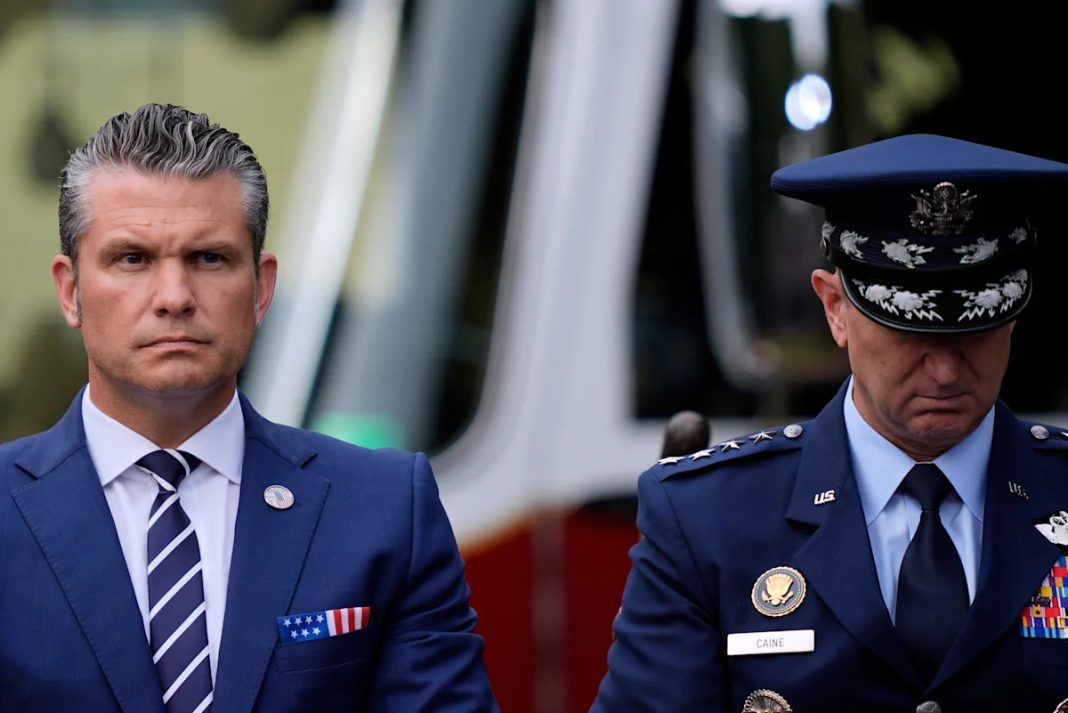The Pentagon’s crackdown on employees accused of mocking Charlie Kirk’s death has startled troops, who fear an increasing stranglehold on what they’re allowed to say.
Defense Secretary Pete Hegseth and other military leaders have denounced any posts critical of the conservative activist, due in part to far-right influencers who have flagged service members they believe are making negative comments about Kirk. That has led to the start of a suspension process, according to a Defense Department official. Several troops also have been fired or punished for social media posts that don’t necessarily attack the slain activist, according to a congressional aide and a person close to the Pentagon.
The overtly political tinge has stunned civilian employees and service members, who pledge an oath to the Constitution and not a political leader. Some worry they will face politically motivated punishments for posts that are seen as disloyal to President Donald Trump, according to more than a half dozen troops and defense officials.
“Dangerous territory and very headhunter-like,” said a defense official, who like others was granted anonymity to avoid potential recrimination. “People are getting swept up for anything that is ‘woke.’”
The focus on social media goes beyond top Pentagon leadership to the military branches. The Air Force on Wednesday issued new social media guidance about what troops could say online. Air Force Secretary Troy Meink, in the memo, told commanders to use “all tools available” to investigate and punish those who violate the rules.
Active duty troops, unlike other federal employees, operate under strict rules on speech. The Uniform Code of Military Justice bars service members from making political statements or attending rallies and fundraisers while in uniform. They also may not make disparaging comments about the chain of command.
But the Defense Department’s recent social media actions could extend further.
“We see abuse of these reasonable speech restrictions that have long been upheld to instead instill a culture of fear and intimidation,” said Rachel VanLandingham, a retired Air Force officer and military lawyer. “I fear it will turn the military from being an apolitical institution to being a political one.”
The Pentagon has appeared the most outspoken federal agency on Kirk’s death. Officials argued their actions were a natural response to a vicious murder.
“We will not tolerate military or civilian personnel who celebrate or mock the assassination of a fellow American,” said Pentagon spokesperson Sean Parnell. “Every service member and civilian at the department takes an oath to defend the Constitution against all enemies foreign and domestic. Those in our ranks who rejoice at an act of domestic terrorism are unfit to serve the American people at the Department of War.”
The new suspensions and reviews follow months of increasingly political talk by Pentagon leadership. Hegseth has placed much of his attention on removing transgender troops and eliminating diversity, equity and inclusion programs in the services. The department has also banned officials from speakingat think tanks, a traditional practice across administrations, restored the names of U.S. military bases that had once honored Confederate leaders and taken down the portraitsof defense and military officials who sparred with Trump.
“There have been rules and norms forever for uniforms and civilians, and political speech has always been off limits, and for good reason,” said a second defense official. “But everyone needs to understand that posts or comments that might have led to an admonishment or counseling before can now end a career.”
Kingsley Wilson, the Pentagon’s press secretary, underscored the increasingly political nature of the department when she wrote this week that some “liberal Americans support political violence,” on her personal X account. “There can be no unity with this evil.”
Online activists have supported the effort, using the hashtag #RevolutionariesintheRanks to flag what they consider offensive posts of Kirk by service members, from the rank and file to top officers.
More firings will likely come, predicted Sean Timmins, a retired Army officer and lawyer.
He noted that after the killing of George Floyd in 2020, troops were disciplinedfor racially insensitive remarks. “So I can see that same prism being used in the reverse against people who engaged in comments against Charlie Kirk,” he said.
In the most high-profile instance so far, Col. Amy Nieman, the principal legal adviser to one of the Army’s most prestigious units, told colleagues she had been suspended pending an administrative investigation into one of her posts, according to a defense official and an email obtained by POLITICO.
Nieman, in the post that led to her suspension, said she was “Signing off for awhile” and that it was “awful to see bickering and histrionics instead of meaningful change.”

